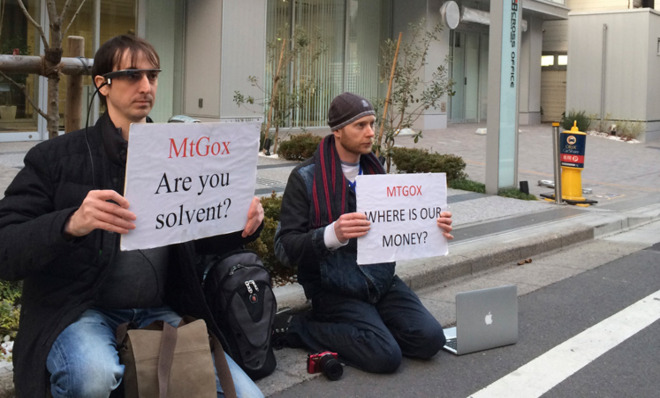Mt Gox is dying. That's a good thing for Bitcoin.
Bitcoin can do better than an overwhelmed website formerly known as a hub for trading Magic the Gathering cards

A free daily email with the biggest news stories of the day – and the best features from TheWeek.com
You are now subscribed
Your newsletter sign-up was successful
Bitcoin just took a body blow. But even though the virtual currency is staggering, the punch Bitcoin just suffered will pay off in the long run.
Mt. Gox, originally known as Magic the Gathering Online Exchange, and now the industry leader in exchanging Bitcoins to normal currency, is offline — taking more than 700,000 Bitcoins, worth an estimated $409 million, with it.
This follows several days of weirdness for Mt. Gox, in which prices on the exchange were hundreds of dollars lower than in the rest of the market. This was largely due to limitations Mt. Gox had placed on withdrawals. Before its website and Twitter feed disappeared, Mt. Gox claimed that the limits on withdrawals were due to a "software issue." But rumors swirled that it was actually because the exchange was insolvent. Mt. Gox finally going offline will only strengthen these rumors.
The Week
Escape your echo chamber. Get the facts behind the news, plus analysis from multiple perspectives.

Sign up for The Week's Free Newsletters
From our morning news briefing to a weekly Good News Newsletter, get the best of The Week delivered directly to your inbox.
From our morning news briefing to a weekly Good News Newsletter, get the best of The Week delivered directly to your inbox.
(Related: Everything you need to know about the Bitcoin boom)
Of course, the risk of a Bitcoin exchange running off with your money is a risk that Bitcoin exchange users have chosen to take. Bitcoin deposits — unlike typical currency deposits at brick-and-mortar banks — are not insured by any government or regulatory authority. While Mt. Gox users can potentially sue Mt. Gox's owners to try and get their money back, there is hardly a guarantee that such a strategy will yield success.
The Bitcoin Foundation, in an open letter trying to reassure users of other exchanges that their funds are safe, notes:
Acting as a custodian should require a high-bar, including appropriate security safeguards that are independently audited and tested on a regular basis, adequate balance sheets and reserves as commercial entities, transparent and accountable customer disclosures, and clear policies to not use customer assets for proprietary trading or for margin loans in leveraged trading. [Coinbase]
Now, it remains to be seen whether independent oversight through industry bodies like The Bitcoin Foundation will be sufficient to reassure currency users, and to prevent further Bitcoin disappearances. Bitcoin has a very libertarian user base that is hostile to the idea of government oversight. This user base is also very decentralized, suggesting that at least for now, oversight for exchanges will have to come from the Bitcoin community and industry.
A free daily email with the biggest news stories of the day – and the best features from TheWeek.com
The libertarian dream is that untrustworthy, nontransparent exchanges that fail to provide customers with adequate security will be put out of business by the magic of the free market. The reality, however, may be that such busts and breakdowns would likely give Bitcoin so much negative publicity that potential new users would be driven away from Bitcoins (and away from virtual currency in general) altogether.
All that said: In the long run, Mt. Gox's death will be a good thing for Bitcoin. Multiple times in the last year — and especially back in the first half of 2013 — the Bitcoin market has been massively disrupted by trading problems on Mt. Gox. It has been extremely difficult for this online trading card exchange to scale up to a world-leading virtual currency exchange. It should be no surprise that other exchange operations run by companies with more experience in the financial industry have arisen to replace Mt. Gox.
Still, in the meantime, Bitcoin's value is falling, now below $500 for the first time since last year. There is no limit to how far the Bitcoin price could plummet — it came up from nothing and could conceivably go back there. However the belief in Bitcoin by the people in the Bitcoin community — which is the thing that has really fueled Bitcoin's meteoric rise — remains strong, and a decently long period of stability following Mt. Gox's shutdown will gradually reduce worries. This will be especially true if this episode forces the remaining exchanges into better security practices.
John Aziz is the economics and business correspondent at TheWeek.com. He is also an associate editor at Pieria.co.uk. Previously his work has appeared on Business Insider, Zero Hedge, and Noahpinion.
-
 The ‘ravenous’ demand for Cornish minerals
The ‘ravenous’ demand for Cornish mineralsUnder the Radar Growing need for critical minerals to power tech has intensified ‘appetite’ for lithium, which could be a ‘huge boon’ for local economy
-
 Why are election experts taking Trump’s midterm threats seriously?
Why are election experts taking Trump’s midterm threats seriously?IN THE SPOTLIGHT As the president muses about polling place deployments and a centralized electoral system aimed at one-party control, lawmakers are taking this administration at its word
-
 ‘Restaurateurs have become millionaires’
‘Restaurateurs have become millionaires’Instant Opinion Opinion, comment and editorials of the day